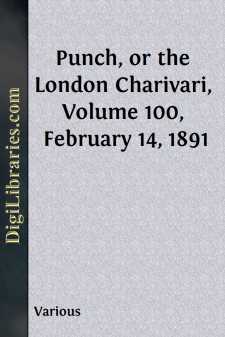Categories
- Antiques & Collectibles 13
- Architecture 36
- Art 48
- Bibles 22
- Biography & Autobiography 813
- Body, Mind & Spirit 142
- Business & Economics 28
- Children's Books 15
- Children's Fiction 12
- Computers 4
- Cooking 94
- Crafts & Hobbies 4
- Drama 346
- Education 46
- Family & Relationships 57
- Fiction 11828
- Games 19
- Gardening 17
- Health & Fitness 34
- History 1377
- House & Home 1
- Humor 147
- Juvenile Fiction 1873
- Juvenile Nonfiction 202
- Language Arts & Disciplines 88
- Law 16
- Literary Collections 686
- Literary Criticism 179
- Mathematics 13
- Medical 41
- Music 40
- Nature 179
- Non-Classifiable 1768
- Performing Arts 7
- Periodicals 1453
- Philosophy 64
- Photography 2
- Poetry 896
- Political Science 203
- Psychology 42
- Reference 154
- Religion 513
- Science 126
- Self-Help 84
- Social Science 81
- Sports & Recreation 34
- Study Aids 3
- Technology & Engineering 59
- Transportation 23
- Travel 463
- True Crime 29
Punch, or the London Charivari, Volume 100, February 14, 1891
by: Various
Categories:
Description:
Excerpt
MODERN TYPES.
(By Mr. Punch's Own Type Writer.)
No. XXIII.—THE TOLERATED HUSBAND.
It is customary for the self-righteous moralists who puff themselves into a state of Jingo complacency over the failings of foreign nations, to declare with considerable unction that the domestic hearth, which every Frenchman habitually tramples upon, is maintained in unviolated purity in every British household. The rude shocks which Mr. Justice BUTT occasionally administers to the national conscience are readily forgotten, and the chorus of patriotic adulation is stimulated by the visits which the British censor finds it necessary to pay (in mufti) to the courts of wickedness in continental capitals. It may be that among our unimaginative race the lack of virtue is not presented in the gaudy trappings that delight our neighbours. Our wickedness is coarser and less attractive. It gutters like a cheap candle when contrasted with the steady brilliancy of the Parisian article. Public opinion, too, holds amongst us a more formidable lash, and wields it with a sterner and more frequent severity. But it is impossible to deny that our society, however strict its professed code may be, can and does produce examples of those lapses from propriety which the superficial public deems to be typically and exclusively continental. Not only are they produced, but their production and their continuance are tolerated by a certain class, possibly limited, but certainly influential.
Amongst these examples, both of lapse and of toleration, the Tolerated Husband holds a foremost place. Certain conditions are necessary for his proper production. He must be not only easy-going, but unprincipled,—unprincipled, that is, rather in the sense of having no particular principles of any kind than in that of possessing and practising notoriously bad ones. He must have a fine contempt for steady respectability, and an irresistible inclination to that glittering style of untrammelled life which is believed by those who live it to be the true Bohemianism. He should be weak in character, he may be pleasant in manner and appearance, and he must be both poor and extravagant. If to these qualities be added, first a wife, young, good-looking, and in most respects similar to her husband, though of a stronger will, and secondly a friend, rich, determined, strictly unprincipled, and thoroughly unscrupulous, the conditions which produce the Tolerated Husband may be said to be complete.
The Tolerated Husband may have been at one time an officer in a good regiment. Having married, he finds that his pay, combined with a moderate private income, and a generous allowance of indebtedness, due to the gratification of expensive tastes, is insufficient to maintain him in that position of comfort to which he conceives himself to be entitled. He therefore abandons the career of arms, and becomes one of those who attempt spasmodically to redeem commercial professions from the taint of mere commercialism by becoming commercial themselves....












